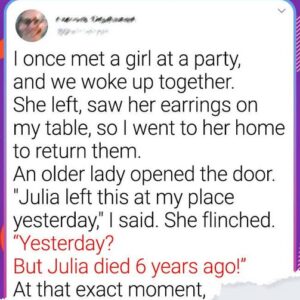
A nurse from California, Julie has been providing hospice care to patients for several years. Prior to providing hospice care, Julie was a nurse in the ICU for nine years. She is also well-known on TikTok. There, she sheds light on death, educating others on vital components like how to cope with such a difficult experience. As well as what happens during the final weeks of someone’s life, detailing how various diseases have various effects. In 2021, she opened up about some experiences providing hospice care. The shared video documents what most people say to her before they die.
Hospice care is incredibly taxing work as it’s emotional but can also be physically draining. As people age, they require a more in-depth approach to care and assistance. In most cases, hospice care is the last stage before death, and providing care comes with a huge responsibility that may range in duties. Some may need bathing, medicine or IV administration, wound dressing, feeding, and changing all while fully immobile. In contrast, others may just need some companionship.
Either way, hospice is a place designed for terminally ill patients, intended to “make them as comfortable as possible,” be it physically, emotionally, or spiritually.
Why She Does It
In a previous interview, Julie disclosed, “I love educating patients and families about what to expect with hospice and what to expect with the specific disease they are dying from,” Julie shared. “I also really like giving the patient and family some comfort knowing we will be there to manage their symptoms.”
Some of her videos detail important factors such as how a person’s skin color or breathing patterns might change, and the nitty gritty of bodily secretions. Noting that although these changes may seem odd or “unusual” they’re actually very typical. She has also explained that each person’s circumstances are unique and therefore it’s hard to know exactly what happens for every person when they die. Or to pinpoint what similarities or differences people experience in those moments. Furthermore, she reveals something that will likely offer peace of mind to anyone worried about a loved one, currently in hospice and about their comfort.
What People Do and Say Before They Die
“The symptoms of the actively dying phase include changes in consciousness, changes in breathing, mottling and terminal secretions. These are normal and not painful or uncomfortable.” She said, adding, “Our bodies take care of ourselves at the end of life – the less we intervene, the better.”
Although experiences differ from person to person, she does note a common topic amongst the majority of her hospice patients and their final words.
“There is something most people say before they die, and it’s usually ‘I love you’ or they call out to their mum or dad – who have usually already died,” she disclosed.

The work that Julie does is invaluable, but not just for her patients and their families. It also comes with other tidbits of knowledge, such as debunking a common misconception that hospice kills people. Or morphine kills them faster, and that everyone in hospice dies immediately.
Resources for Hospice Needs
Losing a loved one is never easy, and neither is the realization that they’re headed for hospice. Luckily, there are resources for addressing these difficulties and videos posted by Julie and other hospice or health care professionals that shed light on difficult topics such as someone’s final days.
Some resources include the Hospice Foundation of America. Whose mission is to support those in need of hospice care and their loved ones to ensure a smooth transition with as little emotional baggage as possible. Another helpful resource for someone looking at care options is a Place for Mom. The organization has support in place all over the US. They’re available by phone or email, on hand to answer questions or help connect families to hospice care centers. Medical care can become expensive, especially without the help of medical insurance. However, many local nonprofit hospitals offer cheaper or free hospice facilities to families unable to afford the cost. If you’re unsure how to pick the right place for your family’s needs, Julie explains some things to consider below.
Death is a difficult topic of conversation as is losing a loved one. It’s not uncommon for people to feel overwhelmed, uncertain, or even frightened. Just remember you’re not alone and there are people and places that offer guidance and support during such a trying time.
Keep Reading: Hospice nurse reveals the unexplained phenomena that happen before you die





